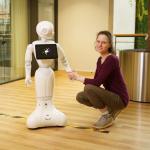Maria Tsfasman
PhD student at TU Delft
As AI applications continue to proliferate in our daily lives, the need for social intelligence in these systems becomes increasingly crucial. To enable long-term performance of social intelligence, AI systems must be aware of important moments, or “hotspots” in user conversations. Till now, conversational hotspots have been mainly approached from the viewpoint of user engagement. However, there has been little consideration of whether participants will recall these moments after the conversation has ended. Studying conversational memory can shed light on which moments are most important in a conversation. In a previous study, we collected a multimodal dataset with first-party memory annotations and showed that eye gaze behaviour predicts the memorability of conversation segments. However, the trained classifiers did not generalise well to new groups and sessions. This suggests that individual variations in group dynamics were not captured by the models but instead were interpreted as noise. To address this challenge, we aim to partner with renowned experts in continual learning from the AFAR laboratory at the University of Cambridge. In a three-month research visit, we will develop a model that utilises state-of-the-art Continual Learning algorithms to predict conversational memorability across new discussion sessions. This collaboration between TU Delft and the University of Cambridge will pave the way for future joint research and publications, contributing to creating a more trustworthy social AI. We were kindly awarded TAILOR connectivity funding for a three-month research visit to the University of Cambridge by Maria Tsfasman, a third-year PhD student from TAILOR TU Delft who has been invited to the non-TAILOR University of Cambridge by Dr. Hatice Gunes. We will also use this funding for a one-week visit to Cambridge by Dr. Catharine Oertel and Prof. Catholijn M. Jonker, both from TU Delft and serving as supervisors for the project.
Visit to: Hatice Gunes, Nikhil Churamani Affective – Intelligence and Robotics Laboratory, the University of Cambridge
More information about Maria: https://scholar.google.com/citations?user=HwyJRXoAAAAJ&hl=en
